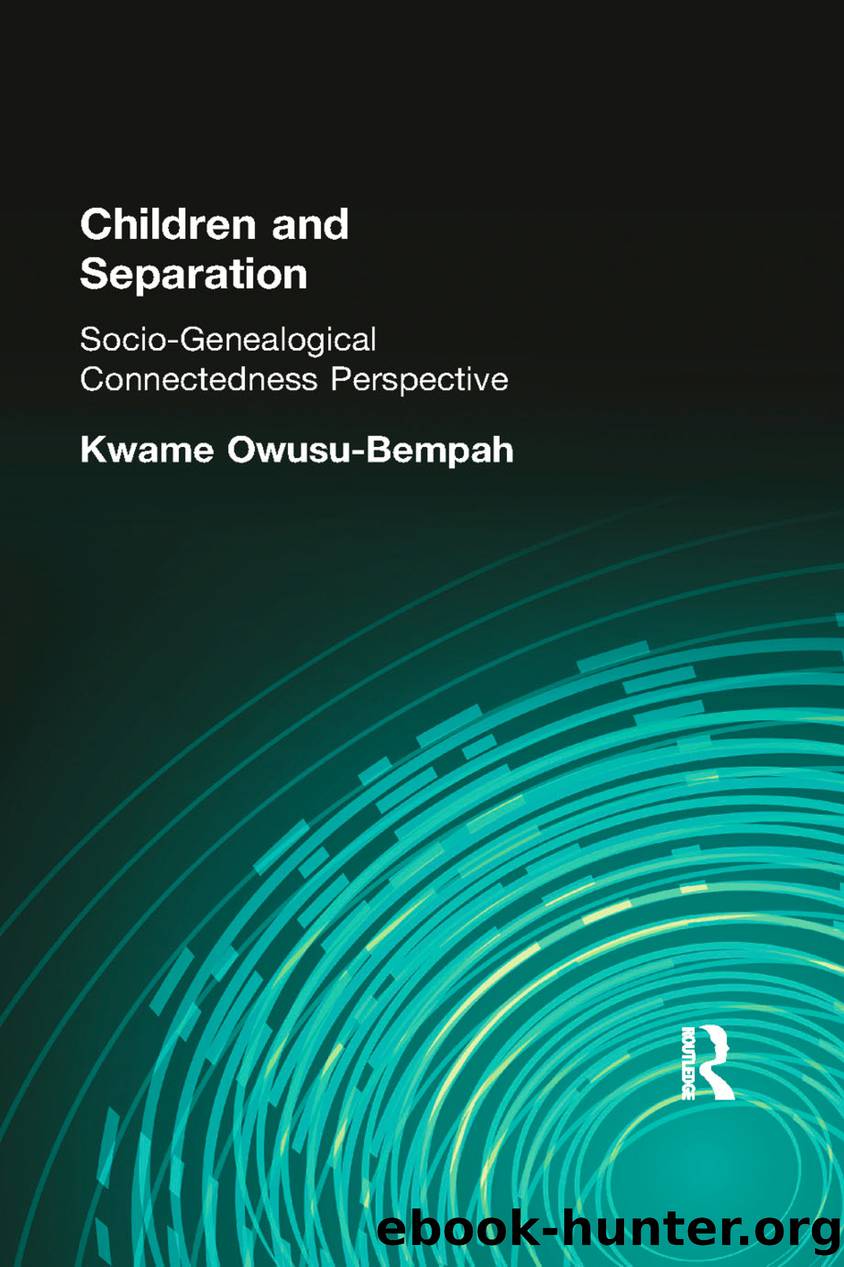Children and Separation by Owusu-Bempah Kwame;

Author:Owusu-Bempah, Kwame;
Language: eng
Format: epub
Publisher: Taylor & Francis Group
Published: 2007-08-15T00:00:00+00:00
6 Socio-genealogical knowledge and identity
DOI: 10.4324/9780203695029-6
A genealogically bewildered child is one who has either no knowledge of his natural parents or only uncertain knowledge about them. The resulting state of confusion and uncertainty fundamentally undermines his security and thus affects his mental health.
(Shants, 1964, p. 133)
Can any description of the feeling of rootlessness be more vivid than Shantsâ portrait of it, except perhaps, Stonequistâs (1937) portrayal of âthe marginal manâ? It epitomizes the significance of genealogical knowledge to oneâs psychological integrity and mental health. It also makes clear that while Bowlby saw âmother loveâ as essential for mental health, Shants regarded ancestral knowledge as a prerequisite. Shants employed the term genealogical bewilderment to describe the presenting problems of a large number of adopted children he saw in a child guidance clinic in north Wales. His clinical observations of the adjustment difficulties which the children were experiencing led him to suggest that, in addition to the general causal factors of their adjustment problems, adopted children have the burden of what he called adoption stress; that is, the stress to which adopted children are subjected as a result of their adoptive status. Those observations revealed genealogical bewilderment to be a major factor in adoption stress.
Shants recognized that it is not only adopted children who may lack knowledge of their birth parents; that genealogically bewildered children may be found in any family where one or both of the genetic parents are missing (or denigrated). Thus, stepchildren and foster children may also show this symptom. So may those reared by one biological parent, most notably children of unmarried mothers by choice, the offspring of donor insemination, as well as children in divorced families.
What genealogically deprived children share in common is at least one unknown parent or one of whom the childâs knowledge is inadequate or doubtful. Shants also recognized that although children of parents whose origins are unknown or maligned may not always show overt concern about their lack at every stage of their development, at some time, usually in early adolescence, they will begin searching for clues. Both historical and contemporary investigators and writers agree with Shants that once they have begun their preoccupation with the task can reach disturbing proportions. They will gather directly or indirectly every shred of evidence which they feel will put them on the right trail. Some have described the preoccupation as amounting to an obsession, in that genealogically deprived children seem to believe that solving this problem will lead to solutions to all their troubles (Triseliotis, 1973; Triseliotis and Hill, 1990; Triseliotis et al., 1997; Baran and Pannor, 1993; Walby and Symons, 1990). Uncertainty and confusion resulting from ignorance about oneâs exact origins appears to stimulate pressure of such magnitude that the desire to know or find out becomes virtually uncontrollable.
According to Shants, the child who has no knowledge of their natural parents or only fuzzy knowledge about them may become genealogically bewildered. The resulting state of confusion and uncertainty may undermine their sense of belonging and identity.
Download
This site does not store any files on its server. We only index and link to content provided by other sites. Please contact the content providers to delete copyright contents if any and email us, we'll remove relevant links or contents immediately.
Adding Value to Policy Analysis and Advice by Claudia Scott; Karen Baehler(455)
Sociological Perspectives of Health and Illness by Constantinos N. Phellas(444)
Race and American Political Development by unknow(441)
Human and Global Security : An Exploration of Terms by Peter Stoett(425)
American Government and Politics Today by Steffen W. Schmidt Mack C. Shelley Barbara A. Bardes(424)
Control Of Oil - Hardback by Kayal(407)
Entrepreneurship Education and Training: The Issue of Effectiveness by Colette Henry Frances Hill Claire Leitch(364)
The Catholic Church and European State Formation, AD 1000-1500 by Jørgen Møller(355)
Materializing the Middle Passage by Jane Webster;(349)
The World According to China by Elizabeth C. Economy(343)
Left Is Not Woke by Susan Neiman(328)
Turkey's Relations with the West and the Turkic Republics: The Rise and Fall of the Turkish Model by Idris Bal(313)
Theories of Counseling and Psychotherapy: A Case Approach by Nancy L. Murdock(313)
Cross-Cultural Child Development for Social Workers by Lena Robinson(306)
Japan's Ainu Minority in Tokyo by Mark K. Watson(297)
Advances in Child Development and Behavior, Volume 37 by Patricia J. Bauer(295)
Laboratory Life by Bruno Latour(294)
Beyond Service: State Workers, Public Policy, and the Prospects for Democratic Administration by Greg McElligott(284)
The Oxford Handbook of Museum Archaeology by Stevenson Alice;(275)
